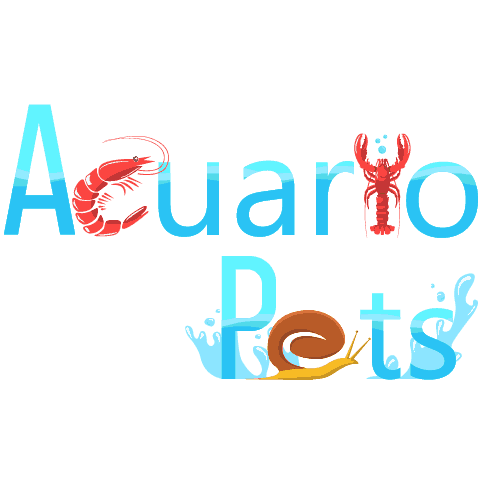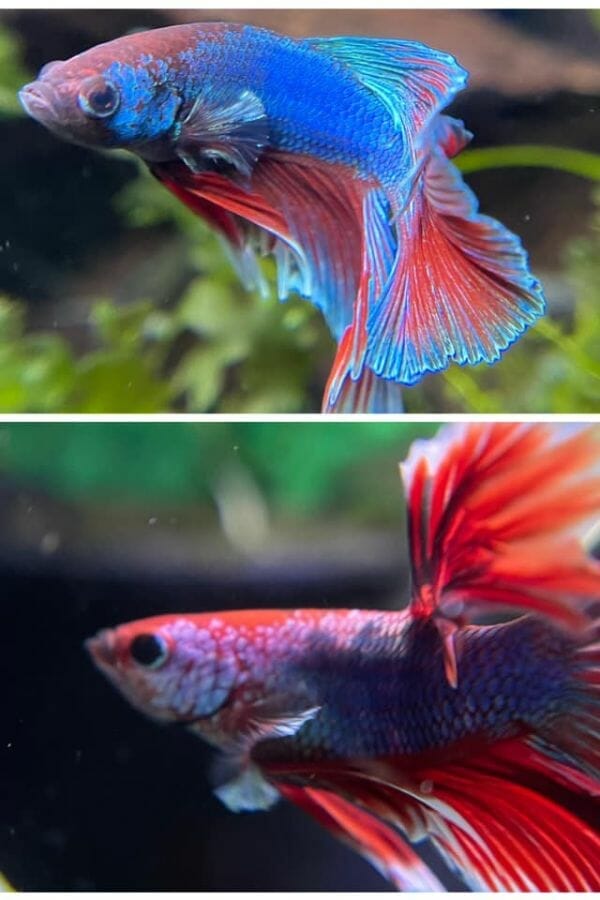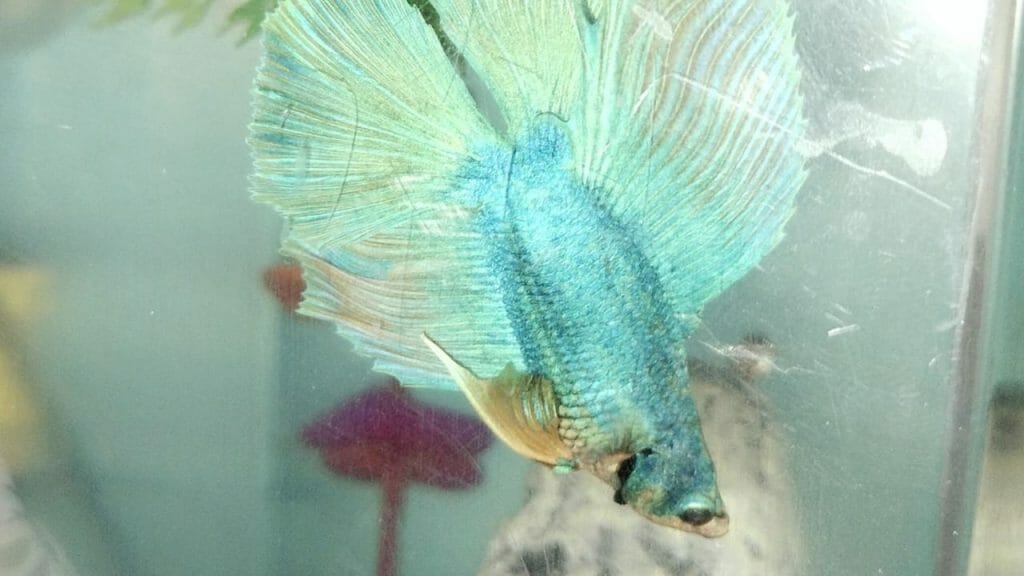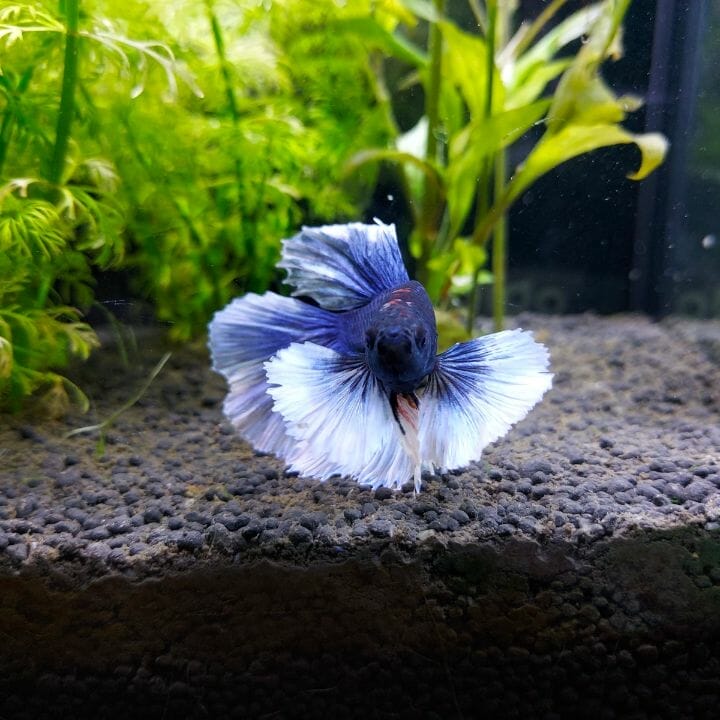What Water To Use For Betta Fish? Beginner’s Guide
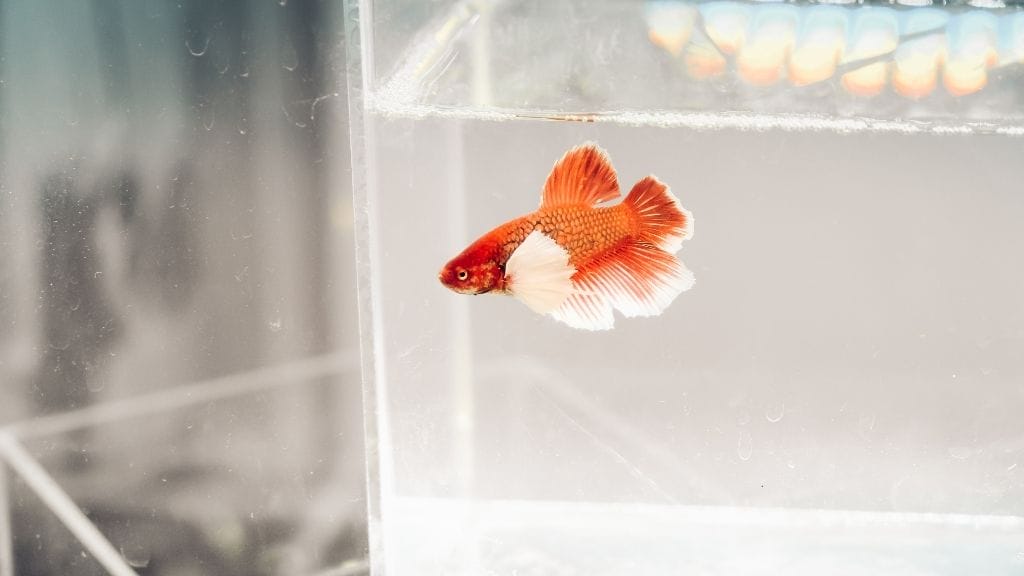
Similar to a man in a gas chamber, the wrong aquarium water can agonizingly suffocate your Betta fish. Turns out, placing the fish in cured/treated water can solve the problem. So, what kind of water to use for Betta fish?
Well, the answer depends on where you get the water. In America, we consider tap water abundant. However, we need to check the water parameters like pH, KH, GH, etc.
You can also try out bottled water, well water, and even distilled water for betta fish. The only thing you need to do is keep the parameters constant.
The perfect water for betta fish should have the following parameters:
- Temperature: 23.8°-27.7°C (75°-82°F)
- Ammonia: 0 ppm
- Nitrate: 10-20 ppm
- Nitrite: 0 ppm
- GH: 50-66.7 ppm
- KH: 53.6- 89.4 ppm
- pH: 6.5-7.5
Note: The BOD value of the water should be at about 1-2 mg/l (ppm). Keep the air pump running to keep the value lower.
Do Bettas Need Special Water?
The answer to this question is a bit complicated. You need not provide any special water for your betta fish. But, these betta fish demand of having fresh water that must be free from chlorine, chloramine, and other heavy metals.
So, for this reason, you should add chemical-free water. Otherwise, you’ll require treating the tap water for your betta fish. There are lots of safe water options available for keeping betta fish.
What Kind Of Water Do You Use For Betta Fish?
While using water for betta fish, you should remain concerned about the water parameters for the betta. Make sure that there remains no presence of chlorine, chloramine, heavy metals, or any harmful chemicals in the water.
The best water that you can readily afford is tap water. But, you must use treated tap water.
In addition, you can use rainwater, distilled water, spring water, reverse osmosis water, well water, soft water, etc. Also, you can buy betta-specific water from stores.
Want to get a printable version of this infographic? Click here! [If you want to use this infographic on your website, please link back to this post as the source!]
Why Use Treated Water For Betta Fish?
Why do fishes in the public aquarium live better and healthier? The reason is, they have treated water to survive. When fishes have good water, their life span increases, and diseases hardly pop up. The reasons for using the right kind of treated water for Betta fish are,
- Enhances the water quality
- Prevents algae from growing rapidly
- Eliminates all potentially toxic substances
- Improves the life of Betta fish
- Reduces diseases and water greening
- Creates a better habitat for the other fishes
How Do You Prepare Water For A Betta Fish?
Treating the water for Betta fish is the most important step after the food quality. Follow the steps below to know how to treat water for Betta fish.
Equipment you will need:
- pH meter
- Thermometer
- KH, and Nitrate meter
- Water hardness meter/ GH meter
Here is a quick table for Betta fish water parameters:
| Parameters | Usable Range |
|---|---|
| pH | 6.5 – 7.5 |
| Temperature | 75°-82°F (23.8°-27.7°C) |
| GH | 3-4 dGH (50-66.7 ppm) |
| KH | 3-5 dKH (53.6- 89.4 ppm) |
| Nitrate | 10-20 ppm |
Step 1: Balance The pH
Taking a pH meter, we need to measure the pH value. If you find the pH to be lower than 6.5, add more water to mix. General tap water is around 7.5-8.5. To decrease the pH value, you can add tannins. Measure the pH every time you add some tannins to the water. We need the pH to be around 6.5-7.5.
If the pH value is not within the ideal range, you may need to adjust it. Fortunately, adjusting the pH value, i.e. lowering or increasing its value is not that difficult.
There are both commercial and natural products for adjusting pH in an aquarium. I prefer to use the natural product first, i.e. Indian Almond Leaves.
Indian Almond Leaves have tannins. Tannin is highly effective to lower the pH value. You can use one leaf in per square feet area. One leaf is enough for 1 month.
As the leaf deteriorate with time, it will release tannin, and the tannin will keep the pH down.
There are many natural sources for tannin. Some popular ones among hobbyists are Indian Almond Leaves, driftwood, almond bark, etc.
If you want a quicker result, you can go for either API pH UP or API pH Down. Both are very reliable and deliver result much quicker.
Step 2: General Hardness Check
GM or General Hardness is the number of minerals present in the water. The only way to control the hardness of water is by using a good quality filter. Adding some water from an RO filter will reduce the GM. Generally, the pH of water won’t go below the 50 ppm range. Use a water hardness meter to know the GM properly.
If you need to lower down the GH value, use API Water Softener. On the contrary, for increasing the GH, use Seachem Equilibrium.
Step 3: Carbon Hardness Fix
KH refers to the Carbon Hardness of water. When the KH level is higher, your chances of keeping a stable pH increase. Measure the KH level with a KH meter. If the level is lower than usual, add some limestone or dolomite to fix it. Add some fresh filtered water to reduce the KH level when needed.
Step 4: Nitrate Check
Long-term exposure to high levels of nitrate can stress out your Betta fish. Additionally, it can stunt growth, damage organs, and make the fish vulnerable to diseases. The simplest way to decrease the nitrate level is by changing the water. You can use bottled water where the nitrate concentration is near 10 ppm.
Step 5: Temperature Control
The normal temperature range is 75°-82°F (23.8°-27.7°C). Keep the aquarium in a room atmosphere to avoid an increase or decrease in temperature.
Water Test Kit For Betta Fish
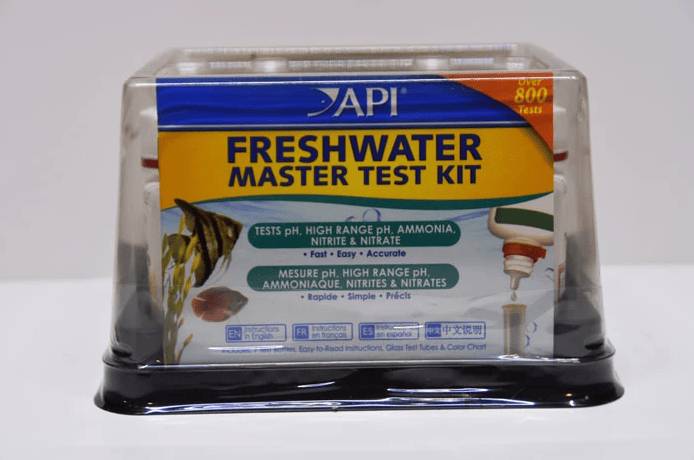
The good thing is, with just one kit, you can check all the water parameters. If you are serious about betta keeping, I’ll highly suggest investing on this water test it. It will increases your success rate in betta keeping by many folds.
I am talking about the API Master Test Kit. With this single kit, you can measure the following water parameters:
- Ammonia
- Nitrite
- Nitrate
- pH
- High Range pH
You’ll get the following items with the kit:
- 7 bottles of testing solution
- 4 glass tubes with cap
- 1 color card
How To Treat Tap Water For Betta Fish?
There are several ways to treat tap water for betta fish, as you can’t directly keep your betta in tap water. I’ve introduced 7 ways of treating tap water. You can choose the affordable and best way for your betta fish.
Let’s go through the details.
1. Boiling The Tap Water
An easy way to treat tap water is to boil the water. The main problem with keeping betta fish in tap water is having the risk of chlorine poisoning. As chlorine is a lightweight component, boiling the tap water fastens the evaporation of chlorine.
So, you need to boil the tap water for around 15-20 minutes. Cool it down before adding the treated water into.
2. Using A UV Light
Using UV lighting alleviates microbiological contamination present in tap water. Several water-treatment processes can’t remove chloramine.
But, UV lighting can eliminate both chlorine and chloramine from the tap water of your betta tank. Hence, it is considered one of the best ways of treating tap water.
To purify the tap water, you should keep the tap water at a minimum exposure of 16,000 microwatts-sec/cm^2. Keep the water for a minimum of 10 seconds under UV rays. However, the duration of UV exposure depends on the amount of water and the types of organic chemicals present in the water.
3. Dechlorinating Agent
You can also treat the tap water using dechlorinating agents. Several Dechlorinators are sulfur dioxide, sodium bisulfite, sodium metabisulfite, etc.
4. Installing Aerating Sprayer
Before adding betta fish into the tank, you can treat the tap water through an aeration system. For this, you need to install an aerating sprayer in the betta tank. An aeration treatment evaporates the volatile chlorine by creating air bubbles.
Although you can’t remove chloramine by aeration, you can eliminate carbon dioxide, methane, chlorine, and other volatile organic components. If you want to remove chloramine, you will have to add any dechlorinating agents too.
5. Using Vitamin C
To treat tap water, vitamin c can be applied for neutralizing the harmful components. You can use vitamin c in two forms. These are ascorbic acid and sodium ascorbate. Using vitamin c is safer than sulfur-based Dechlorinators because vitamin c doesn’t reduce the amount of dissolved oxygen.
Besides, ascorbic acid or sodium ascorbate doesn’t change the pH of the treated water. You can use one gram of vitamin c to neutralize tap water of 100 gallons.
6. Pre-filter With Reverse Osmosis
Another convenient way to treat tap water is by applying the reverse osmosis process. In this neutralization process, you need to pass the tap water through a semi-permeable membrane. As a result, the sediments, copper, chlorine, irons, and other dissolved contaminants.
I recommend buying the COODIA Internal Water Killer Filter Aquarium Pump
7. Using Carbon Filter
The last method is to use an activated carbon filter to treat tap water. Through this filter, the contaminants get absorbed into the carbon.
This results in pure water which is free from chlorine, chloramine, and other harmful organic compounds. You can use this filter in your betta tank. If you’re confused about selecting a carbon filter, you can choose AquaClear Activated Carbon Filter.
How Long Does Tap Water Take To Dechlorinate For Betta Fish?
It depends on the volume of water, the concentration of the chlorine, and the process of dechlorination that you select.
If you leave the water sitting in an open space, the chlorine will take 1-5 days to get evaporated. Besides, adding dechlorinating agents, filtering the water, or other processes fasten the evaporation of chlorine.
Otherwise, you can simply boil the tap water for 10-15 minutes. Cool the water down before adding it to the tank. In addition, when you add water conditioners, it’ll be fine to let the water sit for around 15-20 minutes.
After setting up the entire tank, you should run the filter and heater along with the water. Take 24-48 hours to run the water before adding your betta fish.
How Long Do You Have To Let Tap water Sit For Betta Fish?
When you want to use tap water for your betta fish, you should let the water sit for at least 24 hours or more to remove the chlorine and other toxic components.
Because of being volatile, the chlorine will get evaporated if you let the tap water sit for several hours. Also, letting tap water sit reduces carbon dioxide and stabilizes the pH of the water.
Can You Use Spring Water For Betta Fish?
Among several safe options, you can use spring water for betta fish.
When you use spring water for your betta fish, you need not worry about the water parameters. Such is because the pH, water hardness, carbonate hardness, and other water quality remain ideal.
Sometimes, the betta owners assume both distilled water and spring water are the same. But, the distilled water becomes processed. So, this water lacks minerals and nutrients.
On the other hand, your betta fish will get the required nutrients, prebiotics, and minerals if you add spring water to the tank. Moreover, spring water contains higher oxygen content.
In addition, betta fish do not feel the water pressure due to the levitational quality of spring water. Hence, your betta fish will swim more comfortably in spring water than in any other water option. But, using spring water is a kind of luxury or expensive option.
How Can I Make My Betta Fish Water Safe Without Conditioner?
It’ll not be a big issue if you do not want to use any conditioner to treat water for betta fish. There are several neutralization processes that you can use to make your betta fish water safe.
You can boil the water, use vitamin c treatment, reverse osmosis or carbon filter, UV radiation, and so on. These treatments remove the chlorine and other dissolved organic components faster.
You can also let the water sit overnight. Although this may evaporate the volatile chlorine, chloramine will not get removed in this way.
How Much Water Does A Betta Fish Need?
Although betta fish aren’t good swimmers, these fish remain pretty active. Hence, they require plenty of room to roam around and swim comfortably in the tank.
According to the experts, a betta fish requires a minimum of 5 gallons (19 liters) of water to thrive well.
If you keep more than two betta fish together, you may need to keep at least 20-gallon water in the betta fish tank.
However, the water gets polluted pretty quickly in the smaller tank. Moreover, your betta fish will get more oxygen in a larger tank where there is more water. For this reason, you should try to provide around 5-10 gallons of water for keeping a single betta fish.
How Often Should You Change The Water Of Your Betta Tank?
To remove the organic wastes, you must change the tank water regularly. But, the frequency of water changes depends on several factors.
If your betta tank holds 5 gallons (19 liters) of water, you should change around 40% water every week.
Besides, if the betta tank capacity is 10 gallons (38 liters), a weekly 20-30% water change will be sufficient. On the other hand, a weekly 15% water change will be suitable for a betta tank with a proper filtration system.
Generally, there generates less nitrate buildup in larger tanks than in smaller tanks. Besides, the presence of beneficial bacteria in the filter reduces the ammonia by a larger amount.
Also, the frequency of water change depends on having live plants, substrate, the number of tank mates of betta, the type of foods, etc. If you want to know details, you should go through this writeup- How Long Can A Betta Fish Go Without Water Change?
What Happens If I Put My Betta Fish In Tap Water?
Keeping your betta fish in tap water means killing these fish.
It’s pretty usual to expect the presence of chlorine, chloramine, and other harmful heavy metals in tap water. When you put your betta fish in tap water, your betta fish will suffer from chlorine poisoning.
Due to coming in touch with tap water, the chlorine in water destroys the gills of betta fish causing gill necrosis. As a result, this gill necrosis causes respiratory problems in betta. Besides, the chlorine and chloramine in tap water severely damage the living cells of this fish.
In this way, the heavy metals and other harmful chemicals present in tap water turn lethal to betta fish. If you don’t want to kill your betta fish, it’ll be wise not to keep these gorgeous pets in tap water.
You can also have a look at this article to find out 20 more weird reasons for betta fish death.
Is Purified Water Safe For Betta Fish?
Since purified water goes into processes to remove all impurities, many betta fish owners assume this water is safe for the betta. But, you should not use purified water for your betta tank.
Although there remain no harmful contents, this purified water doesn’t contain beneficial nutrients for betta either. Hence, purified water isn’t safe for betta fish.
Can You Use Bottled Water For Betta Fish?
There is no way you can use bottled water directly for fish. Bottled water contains either more or less than the 6.5-7.5 pH level. Then again, the GH and KH levels may not fit your beloved Betta fish.
However, you can use bottled water if you know how to treat it for Betta fishes. Some brands offer the perfect blend of pH, KH, and GH for your fish to thrive. You can use those types of bottled water.
No matter what you do, check the parameters first before you put your fish in it.
Can I Use Distilled Water For A Betta Fish?
Distilled water contains no chlorine, contaminants, or harmful ions. But is it good for Betta fishes? Well, the answer is no.
Turns out, betta fishes need nutrients and minerals to thrive. So, avoid using just distilled water. You need to add a bunch of minerals to improve the distilled water quality. They don’t come cheap.
If you don’t want to break the bank, try using tap water instead. It’s easier and cheaper to treat.
Frequently Asked Questions
How long should water sit before adding Betta?
After calculating the pH, temperature, and hardness, you need to leave the water for 15 mins. Give the water another check before adding your beloved Betta fish. Doing so will reduce the stress for the fish.
How can I tell if my Betta is happy?
Happy betta fishes have vibrant colors with smooth swimming movements. Other parameters include fins are open (Not taut), feeds regularly, and stays upright. Sick betta fishes tend to stand on the bottom more often.
Is bottled spring water safe for fish?
Even if you bring bottled spring water for fish, the pH and other water parameters need to be safe. If the water fulfills those requirements, you can keep your betta in it.
What water do you fill a fish tank with?
You should always fill a fish tank with treated water. The water can be from the tap, spring, or bottled. Just keep these parameters in check, and you are good to go.
Nitrite: 0 ppm
GH: 50-66.7 ppm
KH: 53.6- 89.4 ppm
Temperature: 23.8°-27.7°C (75°-82°F)
Ammonia: 0 ppm
Nitrate: 10-20 ppm
pH: 6.5-7.5
Is Brita Water Safe For Betta Fish?
Brita water filters remove chlorine, zinc, copper, and other minerals from hard water. So, using Brita water for betta fish can be a safe option. However, try checking the pH and other parameters before putting your fish in it.
Is Hard Water Bad For Betta Fish?
Hard water has a high concentration of minerals, which can damage the organs of betta fish. Additionally, the pH of hard water is high and dangerous for betta fishes to live. You can expect the fish to die within a week.
Is Rainwater Good For Betta Fish?
Rainwater hardly contains any pollutants, but for your fishes, the water is a little acidic. Then again, rainwater doesn’t have all the minerals for Betta fishes. If you want to use rainwater, try adjusting the pH and mineral concentration.
Can You Use Boiled Tap Water For Betta Fish?
Yes. Boiling tap water removes the chlorine content from tap water. Turns out, your betta fishes won’t have a hard adjusting in it. Tap water is full of nutrients, and you need to leave it overnight after boiling.
Can You Use Tap Water For Betta Fish If Left Overnight?
Tap water has a lot of nutrients and minerals. However, most water-refine plants add a small amount of chlorine to prevent germ buildup. Leaving the tap water overnight won’t do any good for the chlorine. However, if you heat the water and leave it overnight, there will be no problem putting betta fishes in it.
Can You Use Fiji Water For Betta Fish?
Fiji water contains a low concentration of minerals. To give your betta fish a healthier life, avoid Fiji water. Then again, having no buffering capacity, the water will harm the fish slowly. You can try treating the water, but it will cost you a fortune.
EndNote
When it comes to aquarium fishes, Betta is the cream of the crop. However, they require top-notch care and water condition for thriving better. Hope now you know what kind of water to use for betta fish.
About Author
Hello, I’m Muntaseer Rahman, the owner of AcuarioPets.com. I’m passionate about aquarium pets like shrimps, snails, crabs, and crayfish. I’ve created this website to share my expertise and help you provide better care for these amazing pets.
Disclaimer
This site is owned and operated by Muntaseer Rahman. AcuarioPets.com is a participant in the Amazon Services LLC Associates Program, an affiliate advertising program designed to provide a means for sites to earn advertising fees by advertising and linking to Amazon.com. This site also participates in other affiliate programs and is compensated for referring traffic and business to these companies.
